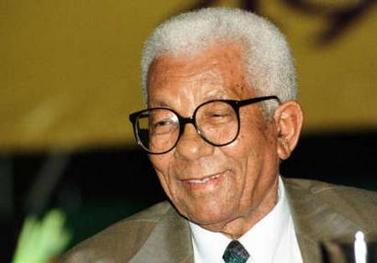
Walter Sisulu
Walter Max Ulyate Sisulu born on May 18, 1912 was a South African anti-apartheid activist and member of the African National Congress, serving at times as Secretary-General and Deputy President of the organization. He was incarcerated at Robben Island, where he served 26 years’ imprisonment.
Sisulu was born in Ngcobo in the Union of South Africa. His mother, Alice Mase Sisulu, was a Xhosa domestic worker and his father, Albert Victor Dickinson was white. Dickinson didn’t play a part in his son’s life as he together with his sister were raised by his mother’s family, who were descended from the Thembu clan. Sisulu founded Sitha Investments in 1939 to help Blacks and Indians to buy houses in Apartheid South Africa. Sitha was the only black-owned estate agency in South Africa.
Sisulu joined the ANC in 1941. In 1943, together with Nelson Mandela and Oliver Tambo, he joined the ANC Youth League, founded by Anton Lembede, of which he was initially the treasurer. He later distanced himself from Lembede after Lembede, who died in 1947, had ridiculed his parentage. Sisulu was a political networker and had a prominent planning role in the militant Umkhonto we Sizwe (“Spear of the Nation”).
At the Treason Trial (1956–1961), he was eventually sentenced to six years, but was released on bail pending his appeal. He went underground in 1963, but was caught at Rivonia on July 11, along with Govan Mbeki, Ahmed Kathrada and 14 others. At the conclusion of the Rivonia Trial (1963–1964), he was sentenced to life imprisonment on June 12, 1964. With other senior ANC figures, he served the majority of his sentence on Robben Island.
In October 1989, he was released after 26 years in prison, and in July 1991 was elected ANC deputy president at the ANC’s first national conference after its ban was lifted the year before. He remained in the position until after South Africa’s first democratic election in 1994.
In 1992, Sisulu was awarded Isitwalandwe Seaparankoe, the highest honour granted by the ANC, for his contribution to the liberation struggle in South Africa. He died on May 5, 2003 and was given an official burial on May 17, 2003. The Walter Sisulu National Botanic Garden, Walter Sisulu University and Walter Sisulu Local Municipality are named after him.









